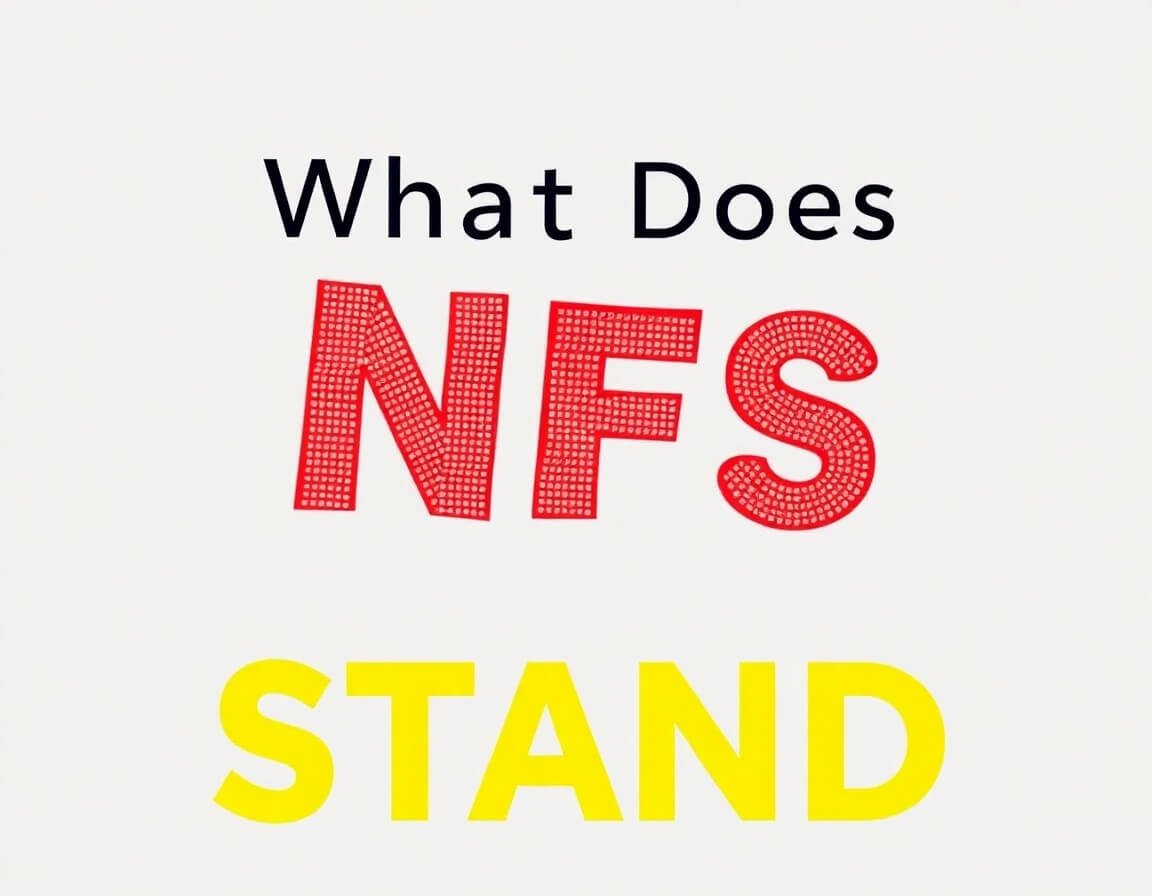
What Does NFS Stand For? Exploring Its Meanings and Uses Across Different Contexts
Business 3 Sherri Bryant November 22, 2024

In today’s fast-paced digital world, abbreviations and acronyms are everywhere. One of the most commonly encountered acronyms is NFS. If you’ve spent time on social media, browsing online marketplaces, or diving into technology, you may have seen this acronym used in a variety of contexts. But what does NFS stand for exactly?
This article will explore the multiple meanings of NFS and how it’s used in different fields such as technology, gaming, business, and casual conversation. By the end, you’ll have a comprehensive understanding of NFS and how it applies in various situations.
Table of Contents
ToggleThe Most Common Meaning: “Not For Sale”
One of the most widely recognized uses of NFS is “Not For Sale.” You’ll typically come across this abbreviation in online marketplaces, on social media, or in discussions about products or collectibles.
When something is labeled NFS, it means that the item is not available for purchase. This could refer to a wide range of things, such as personal belongings, rare collectibles, or even digital content like artwork or software. The term NFS signals to potential buyers that the item is not for sale, regardless of how much they might be willing to pay.
Why Do People Use “NFS”?
- Personal Items: People may use NFS to indicate that certain personal items, such as family heirlooms or sentimental possessions, are not available for purchase.
- Rare Collectibles: Rare or limited-edition items like vintage toys, comics, or memorabilia may be marked NFS because they are too valuable or unique to be sold.
- Exclusive Content: Artists, game developers, or other creators may label digital content NFS if they choose not to sell or release it to the public.
By using NFS, individuals can clearly communicate their intent to keep the item for personal use without worrying about unsolicited offers or discussions about pricing.
NFS in Gaming: “Need for Speed”
In the gaming world, NFS is most often associated with the Need for Speed series, one of the most popular and influential video game franchises in history. Developed by Electronic Arts (EA), Need for Speed (NFS) has captivated millions of gamers around the world with its high-octane racing action, thrilling gameplay, and dynamic graphics.
What is Need for Speed?
Need for Speed is a series of racing video games that focus on street racing, high-speed chases, and vehicle customization. The series first launched in 1994, and since then, it has produced numerous sequels, spin-offs, and updates, making it one of the longest-running and most beloved franchises in the gaming industry.
The NFS franchise is known for its fast-paced racing action, open-world environments, and thrilling chases with law enforcement. Players take control of various cars, participate in illegal street races, and build up their reputations as the fastest racers on the road.
Key Features of Need for Speed Games
- Street Racing: Most NFS games revolve around illegal street racing in which players compete against opponents in various locations around the world. These races often feature intense chases with police, adding to the excitement.
- Customization: One of the critical features of the NFS series is the ability to customize vehicles. Players can modify the appearance and performance of their cars, allowing for a personalized racing experience.
- Variety of Vehicles: NFS games feature a wide range of cars, from everyday street cars to exotic supercars. This gives players a diverse selection of vehicles to choose from and race with.
- Storylines and Missions: Several NFS titles include storylines and missions that keep players engaged. These narratives often involve themes of revenge, rivalries, or the quest to become the best street racer.
Popular Titles in the NFS Series
The Need for Speed series has produced numerous beloved titles over the years, including:
- Need for Speed: Underground (2003) – This title introduced car customization and street racing culture and became a fan favorite.
- Need for Speed: Most Wanted (2005) – Known for its thrilling police chases and open-world gameplay, this title remains one of the most popular entries in the series.
- Need for Speed: Hot Pursuit (2010) – A reboot of the classic Hot Pursuit title, this game featured high-speed police pursuits and spectacular visuals.
- Need for Speed: Payback (2017) – A newer installment in the series, offering an action-packed experience and a focus on story-driven missions and heists.
The popularity of Need for Speed has led to the franchise expanding beyond video games, including movies, merchandise, and even live events. NFS continues to be a staple in the racing genre, attracting both old fans and new players alike.

NFS in Technology: “Network File System”
In the world of technology, NFS stands for “Network File System,“ a protocol used to allow files to be shared over a network. Developed by Sun Microsystems in the 1980s, NFS enables computers to access and manage files stored on a remote server as if those files were on the local machine.
How Does NFS Work?
NFS operates in a client-server architecture. The NFS server stores the files, while the NFS client is the device or machine that accesses and interacts with those files. The client can be a workstation, laptop, or any other device capable of connecting to the server. NFS allows clients to read, write, and execute files stored on the server, providing a seamless experience for users.
Why Use NFS?
- Centralized Storage: NFS allows data to be stored centrally on a server, making it easier for users to access and manage files across multiple devices.
- Cross-Platform Compatibility: NFS supports various operating systems, including Unix, Linux, and Windows. This makes it a versatile choice for businesses and organizations that use diverse systems.
- Cost-Effective: NFS provides an affordable solution for file-sharing and data management, especially in large-scale networks. It eliminates the need for individual storage devices for each machine, reducing hardware costs.
- Remote Access: NFS allows users to access files remotely, enabling them to work from anywhere within the network without needing to move data between machines physically.
The Role of NFS in Distributed Systems
NFS plays a critical role in distributed computing environments where multiple devices and servers need to share data. By using NFS, these systems can maintain high levels of efficiency and minimize the overhead required to transfer files between devices.
NFS in Business and Networking: “No Fixed Salary”
In some business contexts, NFS may be used to mean “No Fixed Salary.“ This refers to a compensation structure where an employee’s pay is not set at a fixed amount but somewhat varies based on performance or other factors. Employees working under NFS agreements may be compensated through commissions, bonuses, or a percentage of profits.
Why Use NFS in Business?
- Incentivizing Performance: Companies may use NFS to encourage employees to work harder and increase their output. A performance-based pay structure aligns the interests of employees with the goals of the organization.
- Flexible Compensation: NFS allows businesses to maintain flexibility in how they pay employees, adjusting compensation based on company performance or market conditions.
- Attracting Top Talent: In some industries, particularly sales and marketing, NFS can be used to attract high-performing individuals who are confident in their ability to generate results and earn significant bonuses.
NFS in Social Media and Communication: “Not For Sharing”
Another common usage of NFS in informal contexts is “Not For Sharing.“ This may be used when someone shares a personal photo, story, or piece of information but adds that it is not for public distribution. It’s a way of communicating that something is intended for specific people or situations and should not be shared further.
Common Examples:
- Personal Photos: A person might share a photo online and add NFS to indicate that the image is not meant to be shared on other platforms or with people outside of their immediate circle.
- Sensitive Information: In a group chat or email, someone may write NFS to signal that the information being shared should remain confidential.
Other Uses of NFS
While Not For Sale, Need for Speed, and Network File System are the most common meanings of NFS, the acronym may have other interpretations depending on the context. For instance:
- National Fire Service: In some countries, NFS refers to the National Fire Service, a government agency responsible for firefighting and emergency services.
- National Financial Services: In the financial world, NFS can sometimes refer to National Financial Services, a division of a financial institution offering services like investment and brokerage accounts.
Conclusion: The Versatility of NFS
As you can see, NFS has multiple meanings across a wide range of industries, including gaming, technology, business, and casual communication. Understanding what NFS stands for is crucial because it allows you to interpret its use in various contexts accurately. Whether it’s used to indicate something Not For Sale, represent the high-speed thrills of Need for Speed, or describe Network File Systems in technology, NFS is an acronym that spans a variety of fields and applications.
Next time you encounter NFS, you’ll be able to understand precisely what it means depending on the context, helping you communicate and navigate various areas more effectively.
You may also read: MilkyWay XYZ: Unlocking the Potential of the Future of Space Exploration

As a trusted news source, Editorial Fox prides itself on upholding the highest standards of journalistic integrity. Our commitment to accuracy and fairness ensures that our readers can rely on us for reliable information.
Contact: editorial@rcopa.com
About Editorial Fox
At Editorial Fox, we are committed to delivering high-quality journalism that informs and engages our readers. Our team of experienced journalists and editors work tirelessly to bring you the latest news and analysis from around the world.
Copyright @2024 Editorialfox.com All Right Reserve.


Be the first to leave a comment